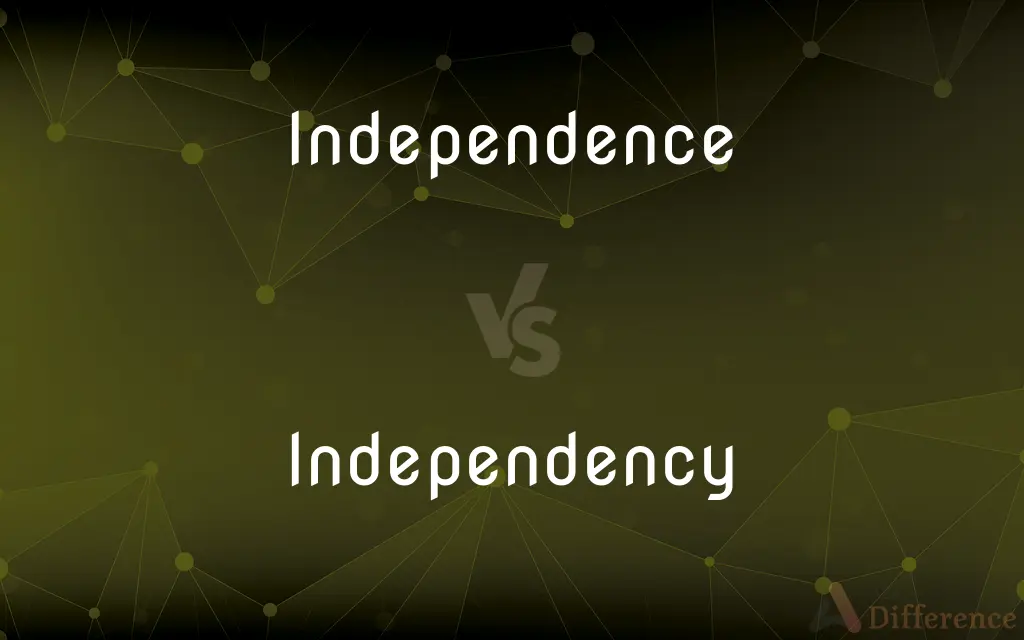Independence vs. Independency — What's the Difference?
Edited by Tayyaba Rehman — By Urooj Arif — Updated on March 18, 2024
Independence denotes the state of being self-sufficient and free from external control, while independency is an older, less common term with similar meanings but often used in specific contexts.

Difference Between Independence and Independency
Table of Contents
ADVERTISEMENT
Key Differences
Independence is widely used to describe the condition of being self-governing or autonomous, applicable to nations, individuals, or groups seeking freedom from control or influence. Whereas, independency, though sharing the core concept of being independent, is less frequently used and sometimes appears in historical or specialized discussions.
The term independence is associated with significant political and social movements, symbolizing sovereignty and self-determination. For instance, national independence days celebrate a country's autonomy. On the other hand, independency may be encountered in historical texts or discussions emphasizing the state or quality of being independent, often with a similar but more nuanced or context-specific meaning.
In contemporary usage, independence is preferred for its clarity and modernity, signifying autonomy in various contexts, including personal, financial, or political independence. Whereas independency, carrying the same root idea, tends to be seen more in academic, legal, or historical analyses, possibly to reflect a specific period’s terminology or to distinguish between subtly different concepts of autonomy.
Regarding personal development, independence is a widely recognized goal, symbolizing self-reliance and the ability to make decisions without external influence. In contrast, independency is less commonly used in this personal context but may sometimes appear in philosophical or reflective writings exploring the nature of self-sufficiency and autonomy.
Independence is celebrated and highly valued, seen as a key to progress and self-actualization. Independency, while understood, is less embedded in popular discourse, possibly due to its archaic tone or specialized usage.
ADVERTISEMENT
Comparison Chart
Usage
Commonly used to denote autonomy and self-governance
Less common, often found in specific or historical contexts
Associated Contexts
Political sovereignty, personal autonomy, financial independence
Historical discussions, specific nuances of autonomy
Modernity
Perceived as a modern and clear term
Considered more archaic or specialized
Cultural Significance
Broadly celebrated, e.g., national independence days
Less present in popular discourse, more academic or reflective
Application
Used in a wide range of contexts to describe freedom from external control
Used more narrowly, sometimes to emphasize a particular aspect of independence
Compare with Definitions
Independence
Political sovereignty.
The colony fought for its independence from the empire.
Independency
Less commonly, an autonomous state or entity.
Certain religious sects formed their independency within the larger church.
Independence
The state of being self-sufficient.
Financial independence is important for personal growth.
Independency
In specific discussions, emphasizing nuances of autonomy.
His thesis explores the independency of judicial systems.
Independence
Freedom from control or influence of another or others.
The country celebrated its independence in 1960.
Independency
Rarely used in personal growth context.
His journey towards independency was marked by self-reflection.
Independence
Personal decision-making freedom.
She values her independence and makes her choices confidently.
Independency
Historical context of achieving autonomy.
The early settlers sought independency from European monarchies.
Independence
A condition of having autonomy.
Living on her own fostered a strong sense of independence.
Independency
The quality or condition of being independent.
The philosopher wrote extensively on the concept of independency.
Independence
Independence is a condition of a person, nation, country, or state in which its residents and population, or some portion thereof, exercise self-government, and usually sovereignty, over its territory. The opposite of independence is the status of a dependent territory.
Independency
An independent state.
Independence
The fact or state of being independent
I've always valued my independence
Argentina gained independence from Spain in 1816
Independency
Archaic term for independence
Independence
The state or quality of being independent.
Independency
Independence.
Independence
(Archaic) Sufficient income for comfortable self-support; a competence.
Independency
An independent territory or state.
Independence
The quality or state of being independent; lack of dependence; the state of not being reliant on, or controlled by, others.
Independency
Independency The Independent movement in 17th-century England.
Independence
The state of having sufficient means for a comfortable livelihood.
Independency
(obsolete) Independence.
Independence
The state or quality of being independent; freedom from dependence; exemption from reliance on, or control by, others; self-subsistence or maintenance; direction of one's own affairs without interference.
Let fortune do her worst, . . . as long as she never makes us lose our honesty and our independence.
Independency
An independent territory or state.
Independence
Sufficient means for a comfortable livelihood.
Independency
Independence.
"Give me," I cried (enough for me),"My bread, and independency!"
Independence
Freedom from control or influence of another or others
Independency
Doctrine and polity of the Independents.
Independence
The successful ending of the American Revolution;
They maintained close relations with England even after independence
Independency
Freedom from control or influence of another or others
Independence
A city in western Missouri; the beginning of the Santa Fe Trail
Common Curiosities
Which term should I use in academic writing?
Independence is generally preferred for clarity and modernity, but independency might be appropriate in discussing historical contexts or specific nuances of autonomy.
Are independence and independency interchangeable?
While they share similar meanings, independence is more commonly used today, whereas independency appears in more specific or historical contexts.
Why is independence more popular than independency?
Independence is perceived as more modern and clear, fitting a wide range of contemporary discussions on autonomy and self-governance.
Can independency refer to a nation's autonomy?
Yes, though less common, independency can refer to a nation's autonomy, particularly in historical texts.
Is there a significant difference in meaning between the two?
The core meanings overlap significantly, but independence is broader in application, while independency is often used for nuanced or specific discussions.
Can organizations or movements be described using these terms?
Yes, organizations or movements seeking autonomy are typically described as seeking independence, aligning with the term's broader, more modern usage.
How do personal contexts utilize these terms?
Independence is commonly used to describe personal growth and self-reliance, whereas independency is rare and might appear in philosophical or reflective writing.
Is there a preference for one term over the other in legal texts?
Legal texts tend to prefer the term independence for its precision and widespread understanding, though independency may appear in specific legal or historical analyses.
How do cultural perceptions influence the use of these terms?
Cultural values of autonomy and self-determination heavily favor the use of independence, associating it with progress and freedom, while independency is less culturally embedded.
Can the choice between independence and independency impact the interpretation of a text?
Yes, choosing independency might signal a nuanced or specific discussion of autonomy, while independence broadly conveys the idea of self-governance and freedom.
Share Your Discovery

Previous Comparison
Buoyancy vs. Upthrust
Next Comparison
Street vs. DriveAuthor Spotlight
Written by
Urooj ArifUrooj is a skilled content writer at Ask Difference, known for her exceptional ability to simplify complex topics into engaging and informative content. With a passion for research and a flair for clear, concise writing, she consistently delivers articles that resonate with our diverse audience.
Edited by
Tayyaba RehmanTayyaba Rehman is a distinguished writer, currently serving as a primary contributor to askdifference.com. As a researcher in semantics and etymology, Tayyaba's passion for the complexity of languages and their distinctions has found a perfect home on the platform. Tayyaba delves into the intricacies of language, distinguishing between commonly confused words and phrases, thereby providing clarity for readers worldwide.














































